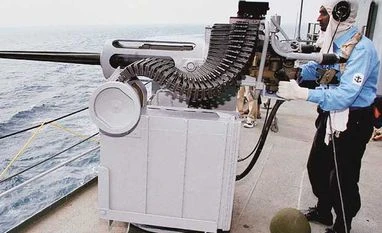Navies of India, US and Japan today placed great importance on the ongoing trilateral naval exercise MALABAR-2015, with a top Japanese official describing the three countries as "indispensable partners" for regional stability.
Addressing reporters on board INS Shivalik here, senior officials of the three navies concurred that the initiative will help increase inter-operability between them against the backdrop of regional maritime peace.
Vice-Admiral B K Verma of the Indian Navy said the initiative will help increase inter-operability among the three participating navies.
Vice Admiral of Japanese Maritime Self-Defence Force (JMSDF) Y Murakawa appreciated the Indian navy for inviting his country to participate in the event, which has been on between India and US since 1992.
Japan is taking part in the exercise for the fourth time.
"We are very proud that three navies are further able to improve cooperation...The three navies are indispensable partners for regional stability," he said.
Vice Admiral J P Aucoin of the US Navy said his country had been partnering with India in the Malabar series of exercises since 1992, adding the two shared the common interest of a "stable economic environment" in the region.
He also commended his Japanese counterparts for their "high standards" of professional capabilities and looked forward to their participation in the future, too.
The three officials reiterated their navies' commitment to ensure free, open and peaceful maritime commerce in the Indo-Pacific region.
During the exercise, the Indian navy will be represented by INS Shivalik and INS Betwa, both indigenous frigates, guided missile destroyer INS Ranvijay and Fleet support ship INS Shakti.
Submarine INS Sindhudhvaj, Long Range Maritime aircraft P81 and integral rotary wing helicopters will also be part of the exercise which began yesterday.
The US Navy, for its part, will see ships from Carrier Task Force (CTF) 70 of the USN 7th Fleet, based in Japan, sail the waters along with Indian and Japanese vessels.
Addressing reporters on board INS Shivalik here, senior officials of the three navies concurred that the initiative will help increase inter-operability between them against the backdrop of regional maritime peace.
Vice-Admiral B K Verma of the Indian Navy said the initiative will help increase inter-operability among the three participating navies.
More From This Section
"Learning doctrinal and operational aspects will go a long way in inter-operability," he said adding personnel from either side could benefit from exchange of ideas to explore implementing them in their respective countries.
Vice Admiral of Japanese Maritime Self-Defence Force (JMSDF) Y Murakawa appreciated the Indian navy for inviting his country to participate in the event, which has been on between India and US since 1992.
Japan is taking part in the exercise for the fourth time.
"We are very proud that three navies are further able to improve cooperation...The three navies are indispensable partners for regional stability," he said.
Vice Admiral J P Aucoin of the US Navy said his country had been partnering with India in the Malabar series of exercises since 1992, adding the two shared the common interest of a "stable economic environment" in the region.
He also commended his Japanese counterparts for their "high standards" of professional capabilities and looked forward to their participation in the future, too.
The three officials reiterated their navies' commitment to ensure free, open and peaceful maritime commerce in the Indo-Pacific region.
During the exercise, the Indian navy will be represented by INS Shivalik and INS Betwa, both indigenous frigates, guided missile destroyer INS Ranvijay and Fleet support ship INS Shakti.
Submarine INS Sindhudhvaj, Long Range Maritime aircraft P81 and integral rotary wing helicopters will also be part of the exercise which began yesterday.
The US Navy, for its part, will see ships from Carrier Task Force (CTF) 70 of the USN 7th Fleet, based in Japan, sail the waters along with Indian and Japanese vessels.
)